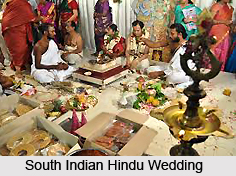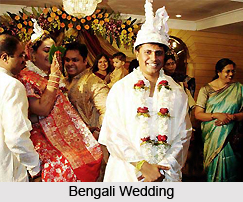 Most of the Indians are unaware of the laws associated with Indian marriages. Although marriage is a social event, one thing should be remembered that it is necessary to register all marriages as every religion has its own personal law to oversee marriages. The Hindu Marriage Act came into power on18 May 1955. This marriage act governs all the Hindu marriages. The Hindu Marriage Act brought about important changes in the law on this subject prevailing earlier.
Most of the Indians are unaware of the laws associated with Indian marriages. Although marriage is a social event, one thing should be remembered that it is necessary to register all marriages as every religion has its own personal law to oversee marriages. The Hindu Marriage Act came into power on18 May 1955. This marriage act governs all the Hindu marriages. The Hindu Marriage Act brought about important changes in the law on this subject prevailing earlier.
The provision under the Act applies to any person who is Hindu by religion and it is also applicable to Buddhists, Jains, and Sikhs too. Under the law of Hindu marriage act the bridegroom should be of 21 years of age and the bride should be of 18 years of age. They both should be of Hindu origin and should not be within the extent of prohibited relationship. Neither party should have a spouse living nor any party should be subject to intermittent attacks of insanity or epilepsy, neither of the partners should not be suffering from mental disorders or should not be unfit for marriage and reproduction of children and both should be of sound mind and capable of giving valuable approval.
Ancient Hindu law allowed polygamy but now it is prohibited and even bigamy is not permitted as per law it is treated as a crime under the Indian Penal code. Marriage among the Hindus was considered a sacramental union and it continued to be so throughout the entire Hindu period. The manu smriti says the bride to hold the hand of the groom for saubhagya or good luck, that means the bride will grow old with her husband and she received him in her life by the just, the creator, the wise and the learned people.
Hindus thought the idea of marriage to be a union basically meant for the performance of spiritual and devout duties. It could not take place without the recital of sacred rites and ceremonies and it was a enduring and eternal union. However with changes in the society marriage among the Hindus, which was essentially a sacrament, took the nature of a contract. The Hindu Marriage Act, 1955 covering the entire India except the state of Jammu & Kashmir has transformed the Hindu law of marriage.
Just like marriages the law also governs divorces. Under the law divorce can be obtained on the grounds of adultery, cruelty, desertion for two years, conversion in religion, unsound mind, etc. The law has also described assured prohibited relationships whose marriage is not lawful like father and daughter, son and mother, brother and sister and many more were strictly not allowed.
The act does not set any stipulate any particulars of the ceremonial for marriage. It states that a Hindu marriage may be dignified in accord with the traditional rites and ceremonies of either party. And it is also important and essential to register a marriage though non-registration does not make it unstable or illegal. But it is always better to legalize since there will be a proof of the marriage and its validity and legalization. It is the duty of the State government to make registration of marriage obligatory.
 India being a cosmopolitan country bears the personal laws of its citizen. As a result each citizen of India is entitled to have his own personal laws in the matter of marriage and divorce. Hindu Marriage Act thus governs Hindus, which provides the situation of a Hindu Marriage. Both the partners should be Hindus and should not be within the scale of prohibited relationship or sapindas.
India being a cosmopolitan country bears the personal laws of its citizen. As a result each citizen of India is entitled to have his own personal laws in the matter of marriage and divorce. Hindu Marriage Act thus governs Hindus, which provides the situation of a Hindu Marriage. Both the partners should be Hindus and should not be within the scale of prohibited relationship or sapindas.
Divorce under the Hindu Marriage Act 1955 can be obtained on the grounds of Adultery, Conversion in religion, Cruelty, Unsound mind, Desertion for two years, Suffering from venereal disease and/or Leprosy has renounced the world not heard for 7 years no resumption of co-habitation for one year after the order of judicial separation, no restoration of conjugal rights for one year after order for restitution of conjugal rights. Some other consequences include husband guilty of rape, sodomy or bestiality and if after an order of maintenance is passed under the Hindu Maintenance and Adoptions Act or the Criminal Procedure Code there has been no living together for one year. Some important sections of this law are mentioned below in brief:
Section 11 or Void marriages - Any marriage solemnized after the initiation of this Act shall be null and void and may, on an appeal presented by either party thereto against the other party, be so declared by a decree of nullity if it contravenes any one of the conditions specified in chapters (i), (iv) and (v) of section 5.
Section 12 or Voidable marriages - Any marriage solemnized, whether before or after the beginning of this Act, shall be voidable and may be canceled by a order of nullity on any of the following grounds like impotency and others.
Section 13 or Divorce - Any marriage solemnized, whether before or after the initiation of this Act, may, on a petition present either the husband or the wife, be dissolved by a decree of divorce on the ground that the other party.
Section 13B or Divorce by mutual consent - Subject to the requirements of this Act a petition for dissolution of marriage by order of divorce may be obtainable to the district court by both the parties to a marriage together, whether such marriage was solemnized before or after the initiation of the marriage Laws (Amendment) Act 1976 (68 of 1976), on the ground that they have been living separately for a period of one year or more, that they have not been co inhabiting and that they have mutually agreed that the marriage should be dissolved.
Section 24 or Maintenance pendent life and expenses of proceedings - Where in any happening under this Act it is evident to the court that either the wife or the husband, as the case may be, has no sovereign income or sufficient for her or his support and the necessary expenses of the proceeding, it may, on the application of the wife or the husband. Order the respondent to pay to the requester the expenses of the proceeding, and monthly during the proceeding such sum as, having regard to the petitioner`s own income and the income of the respondent is always ordered by the court to be reasonable.
Section 25 or Permanent alimony and maintenance -Any court allowing jurisdiction under this Act may, at the times of passing any order or at any time succeeding thereto, on application made to it for the purpose by either the wife or the husband. According to the case order that the respondent shall be liable to pay the applicant for her or his maintenance and support such gross sum or such monthly or periodical sum for a term not exceeding the life of the aspirant having regard to he respondent`s own income and other property.
Thus the Hindu marriage act applies every kind of devise to protect and make the marriages of India legalized through various sections and acts.
More on Indian Marriage Acts
More on Indian Wedding Accessories
More on Indian Religious Weddings
More on Types of Marriages
See also
 Most of the Indians are unaware of the laws associated with Indian marriages. Although marriage is a social event, one thing should be remembered that it is necessary to register all marriages as every religion has its own personal law to oversee marriages. The Hindu Marriage Act came into power on18 May 1955. This marriage act governs all the Hindu marriages. The Hindu Marriage Act brought about important changes in the law on this subject prevailing earlier.
Most of the Indians are unaware of the laws associated with Indian marriages. Although marriage is a social event, one thing should be remembered that it is necessary to register all marriages as every religion has its own personal law to oversee marriages. The Hindu Marriage Act came into power on18 May 1955. This marriage act governs all the Hindu marriages. The Hindu Marriage Act brought about important changes in the law on this subject prevailing earlier.
 India being a cosmopolitan country bears the personal laws of its citizen. As a result each citizen of India is entitled to have his own personal laws in the matter of marriage and divorce. Hindu Marriage Act thus governs Hindus, which provides the situation of a Hindu Marriage. Both the partners should be Hindus and should not be within the scale of prohibited relationship or sapindas.
India being a cosmopolitan country bears the personal laws of its citizen. As a result each citizen of India is entitled to have his own personal laws in the matter of marriage and divorce. Hindu Marriage Act thus governs Hindus, which provides the situation of a Hindu Marriage. Both the partners should be Hindus and should not be within the scale of prohibited relationship or sapindas.

















